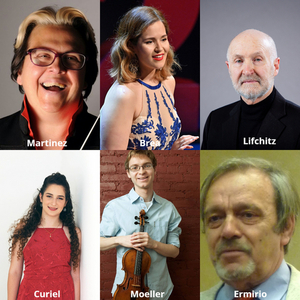North/South Chamber Orchestra Welcomes The New Year With New Music Next Month
The orchestra performs four recent works by living composers on Thursday evening, January 12, 2023.

The North/South Chamber Orchestra welcomes the New Year, performing four recent works by living composers on Thursday evening, January 12, 2023.
The free-admission event will start at 8 PM and end around 9:20 PM.
It will take place at the intimate and acoustically superior auditorium of Christ & St Stephen's Church (120 West 69th St - between Broadway and Columbus) on Manhattan's Upper West Side. First come, first served. No registration or ticket required.
Distinguished soloists for the evening include soprano Maria Brea and violinist Arthur Moeller. Odaline de la Martinez and Max Lifchitz will share the podium.
Wearing a mask while in the auditorium is strongly encouraged.
The program will open with the first US performance of Three Miniatures for Strings by the emerging Israeli composer Carmel Curiel. A recent graduate of the Jerusalem Academy of Music and Dance, Curiel earned first prize in the 2019 Israeli Composers Competition and the 2015 Young Composers Competition sponsored by the New York Philharmonic. Her work regales the listener with a most effective exploration of the multiple coloristic possibilities inherent in string instruments.
Odaline de la Martinez will conduct the American premiere of her recently completed Four Afro-Cuban Poems. A cycle of four songs dealing with the relationship between men and women, the composition was commissioned by the BBC. It employs texts drawn from Motivos de son by the legendary Cuban writer Nicolas Guillen. A close friend of the African American poet Langston Hughes, Guillen is the acknowledged leader of Afrocubanismo, the 1930s artistic movement that established the legitimacy of Black identity in Cuban society, culture, and art. De la Martinez's musical settings closely parallel the manner in which Guillen's poetry mirrors the speech, intonation and highly rhythmic Afro-Cuban language. Born in Matanzas, Cuba, de la Martinez studied at Tulane University before receiving a Marshall Scholarship to pursue graduate studies at the Royal Academy of Music in England. She is the founder and conductor of the highly regarded London-based Lontano Ensemble.
Soprano Maria Brea will be the featured vocal soloist for de la Martinez's songs. Described by the press as a "versatile and luxurious soprano," Brea has performed throughout the world, from Cardiff to Paris, stunning her audiences with her exciting renditions, sparkling clarity and dazzling range.
Italian composer Federico Ermirio trained at the Genova Conservatory and the Academia Santa Cecilia. His music has earned prizes at various international competitions and has been performed throughout Europe, Latin America and Japan. He has served as director of the Antonio Vivaldi Conservatory in Alessandria and Artistic Director of the Pittaluga International Composers Competition. Written during the pandemic lockdown, Petali (Petals) gives expression to feelings of fatality and restlessness. Somewhat programmatic, the music portrays a dream about delicate petals floating aimlessly on the ocean at the mercy of rough winds and the currents. Miraculously, the petals reach a state of static balance and equilibrium, surviving without any noticeable harm.
Violinist Arthur Moeller will appear as soloist for the first US performance of Ermirio's work. A versatile and much sought-after chamber and orchestral performer, Moeller trained at The Juilliard School and has toured throughout the US, China and Europe.
Max Lifchitz's Brightness Aloft consists of ten variations on Xicochi Conetzintle -- a lilting lullaby dedicated to Jesus Christ written in Mexico by Gaspar Fernandez during the 17th century. The music seeks to convey exhilarating feelings of rebirth and renewal elicited by the gradual increase in daylight that inexorably follows the Winter Solstice. Active as composer and performer, Lifchitz began his musical education in his native Mexico City before relocating to New York to study at The Juilliard School with the late Italian composer Luciano Berio. His compositions and performances are available on many recordings accessible via most streaming platforms.
Comments
.png)
|
.png)
|
Videos

